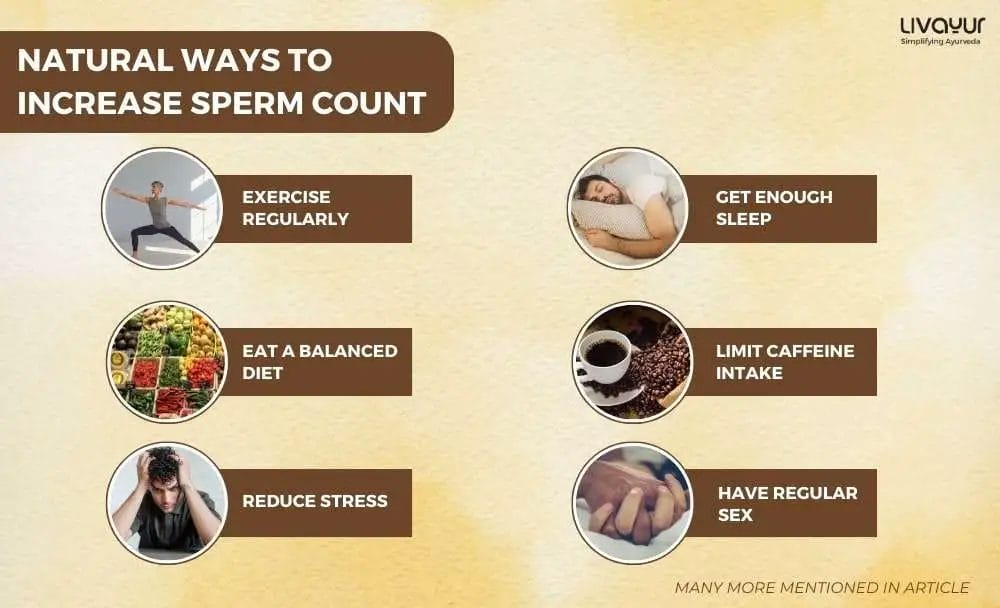
Sperm count is one of the key factors in male fertility, and low sperm count can significantly reduce the chances of conception. While there are medical treatments available for low sperm count, there are also many natural ways to increase sperm count. In this article, we will discuss the 12 best ways to increase sperm count naturally.
What is sperm count?
Sperm count refers to the number of sperm cells in a man’s semen. A normal sperm count typically ranges from 15 million to more than 200 million sperm per millilitre of semen. A low sperm count, also known as oligospermia, can make it more difficult for a man to father a child. Low sperm count and poor sperm quality can be caused by a variety of factors, including lifestyle habits, genetics, and underlying medical conditions. [1] [2]
Importance of sperm count for fertility
Here are some aspects of the importance of sperm count for fertility. [19]
- The sperm count is a defining factor of a man’s reproductive health.
- Sperm count is a crucial parameter in fertility evaluations because a sufficient quantity of healthy sperm is essential for successful conception.
- A higher sperm count increases the likelihood of at least one sperm reaching and fertilizing the egg to increase the chances of pregnancy.
- Low sperm count can significantly impact fertility and make conception more challenging.
Common factors affecting sperm count
Here are some common causes of imbalanced sperm count and their common factors.
1. Hormone imbalance
Reduced hormone production, as seen in conditions like hypogonadism, can disrupt the normal functioning of the reproductive system and contribute to decreased sperm count. [20]
2. Genetic problems (Klinefelter Syndrome)
Genetic conditions like Klinefelter syndrome may impact sperm production, leading to lower sperm counts. [20]
3. Undescended testicles
Men who had undescended testicles as babies may experience compromised sperm production. [20]
4. Structural problems
Structural issues, like damage or blockage of the tubes that transport sperm, whether due to illness or injury, can hinder the proper movement of sperm. [20]
5. Genital infections
Infections in the genital area, including chlamydia and gonorrhea, can negatively impact sperm production and quality. [20]
6. Varicoceles
Enlarged veins in the testicles, known as varicoceles, can reduce sperm count. [20]
7. Previous surgery or hernia repairs
Surgeries on the testicles or hernia repairs can lead to complications affecting sperm production. [20]
8. Testicular overheating
Conditions causing the testicles to overheat, whether due to environmental factors or specific activities, can influence sperm count. [20]
9. Lifestyle choices
Excessive drugs and alcohol consumption can decrease sperm count. [20]
10. Weight factors
Being overweight or obese can lead to altered hormone levels and contribute to reduced sperm count. [20]
12 ways to increase your Sperm Count Naturally
1. Exercise regularly
Regular exercise is not only good for overall health but can also increase sperm count. Studies have shown that men who exercise regularly have higher sperm counts than those who do not. Exercise also helps to reduce stress, which can hurt sperm count. [3]
2. Maintain a healthy weight
Being overweight or obese can harm sperm count. Maintaining a healthy weight through diet and exercise can help to increase sperm count. [4]
3. Eat a balanced diet
Eating a healthy and balanced diet is important for overall health, including reproductive health. A diet rich in fruits, vegetables, whole grains, lean protein, and healthy fats can help to increase sperm count. [5]
4. Avoid alcohol and smoking
Alcohol and smoking can hurt sperm count. Reducing or eliminating alcohol and smoking can help to increase sperm count. [6] [7]
5. Reduce stress
Stress can hurt sperm count. Finding ways to reduce stress, such as meditation, yoga, or exercise, can help to increase sperm count. [8]
6. Get enough sleep
Getting enough sleep is important for overall health, including reproductive health. Studies have shown that men who get less than 6 hours of sleep per night have lower sperm counts than those who get 8 hours of sleep. [9]
If you are struggling to get a good sleep, read our related article on – Ayurvedic remedies for a good night’s sleep
7. Take supplements
Several supplements can help to increase sperm count, such as zinc, folic acid, and vitamin C. These supplements are reported to have varying effects across different demographics and are generally harmless regardless of their effectiveness. However, it is important to talk to a doctor before taking any supplements especially if you have any other health complications. [10]
8. Avoid hot baths and saunas
Hot baths and saunas can harm sperm count. Avoiding these activities can help to increase sperm count. [11] [12]
9. Wear loose-fitting underwear
Tight underwear can increase the temperature in the scrotum, which can harm sperm count. Wearing loose-fitting underwear can help to increase sperm count. [13] [14]
10. Use Ayurvedic remedies
Ayurvedic remedies such as Ashwagandha, Gokshura, and Shilajit may help to improve sperm count and quality. [15]
You can also read our related article on – 20 Proven Ashwagandha Benefits for Men
11. Limit caffeine intake
High caffeine intake has been linked to lower sperm count. Limiting caffeine intake can help to increase sperm count. [16] [17]
12. Have regular sex
Having regular sex can help to increase sperm count. Studies have shown that men who have regular sex have higher sperm counts than those who do not. [18]Want to improve your sex timings? If yes, then read our related article on – How to Increase Sex Timing: Easy Tips To Increase Vitality
FAQs
1. What is considered a low sperm count?
A low sperm count is typically defined as having fewer than 15 million sperm per milliliter of semen.
2. How long does it take to increase sperm count?
It can take several months to increase sperm count through natural methods. It is important to be patient and consistent with these methods.
3. Can medication help to increase sperm count?
Yes, there are medications available that can help to increase sperm count. It is important to talk to a doctor about the best treatment options.
4. Can certain medical conditions affect sperm count?
Yes, certain medical conditions such as diabetes, thyroid problems, and infections can affect sperm count. It’s important to manage any underlying medical conditions to improve overall health and fertility.
5. Can age affect sperm count?
Yes, as men age, their sperm count and quality can decline. However, age is not the only factor that affects sperm count, and older men can have healthy sperm counts.
Conclusion
Low sperm count and poor sperm quality can be significant factors in male infertility. It’s important to note that while these methods can be helpful, it’s always best to consult with a healthcare provider before making any significant changes to your lifestyle or starting a new supplement regimen.
Disclaimer: This article is from a health and wellness perspective only and does not constitute medical advice. Kindly seek the help of a trained medical practitioner before initiating any treatment.
References:
- Semen Analysis – StatPearls – NCBI Bookshelf (nih.gov)
- Male Infertility – StatPearls – NCBI Bookshelf (nih.gov)
- The Impact of Intense Exercise on Semen Quality – PMC (nih.gov)
- Impact of obesity on male fertility, sperm function, and molecular composition – PMC (nih.gov)
- Diet and Male Fertility: The Impact of Nutrients and Antioxidants on Sperm Energetic Metabolism – PMC (nih.gov)
- The effects of smoking and alcohol intake on sperm quality: light and transmission electron microscopy findings – PubMed (nih.gov)
- Smoke, alcohol and drug addiction and male fertility | Reproductive Biology and Endocrinology | Full Text (biomedcentral.com)
- Lifestyle and fertility: the influence of stress and quality of life on male fertility – PMC (nih.gov)
- Sleep Deprivation and Late Bedtime Impair Sperm Health Through Increasing Antisperm Antibody Production: A Prospective Study of 981 Healthy Men – PMC (nih.gov)
- Effects of folic acid and zinc sulfate on male factor subfertility: a double-blind, randomized, placebo-controlled trial – ScienceDirect
- Seminal and molecular evidence that sauna exposure affects human spermatogenesis – PubMed (nih.gov)
- Wet heat exposure: a potentially reversible cause of low semen quality in infertile men – PubMed (nih.gov)
- Boxers or briefs? Loose-fitting underwear may benefit sperm production | News | Harvard T.H. Chan School of Public Health
- Type of underwear worn and markers of testicular function among men attending a fertility center – PMC (nih.gov)
- Approach To Infertility In Ayurveda (iamj.in)
- Coffee and caffeine intake and male infertility: a systematic review – PMC (nih.gov)
- Effect of Stress and Caffeine on Male Infertility – PMC (nih.gov)
- Analysis of semen parameters during 2 weeks of daily ejaculation: a first in humans study – PMC (nih.gov)
- SEMEN ANALYSIS
- Low sperm count





















